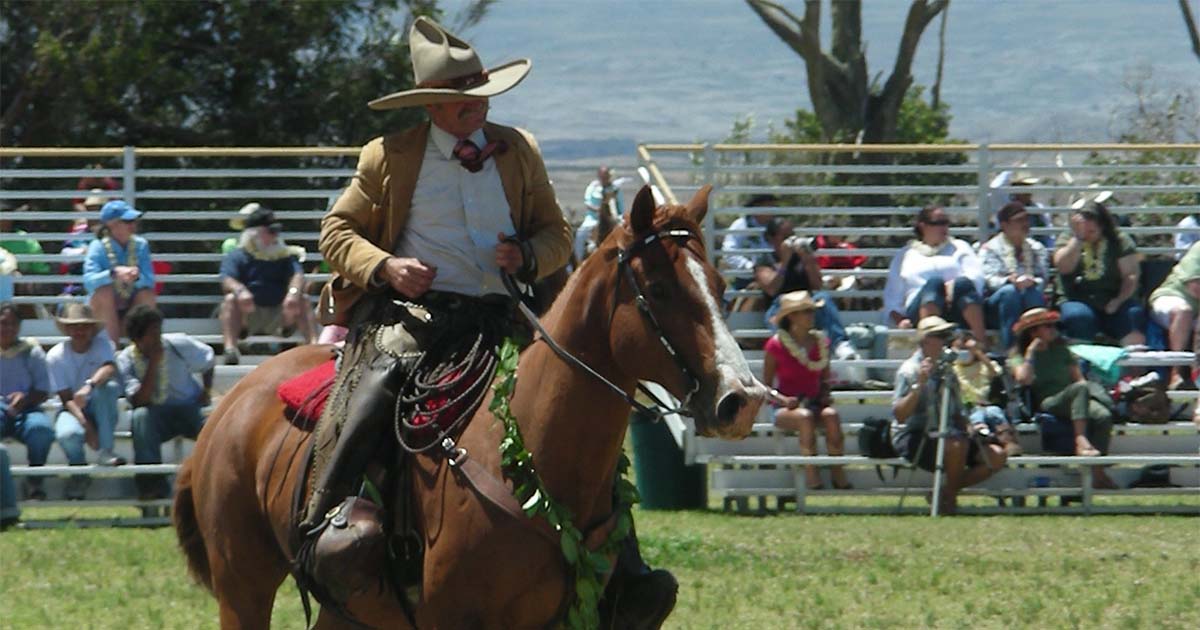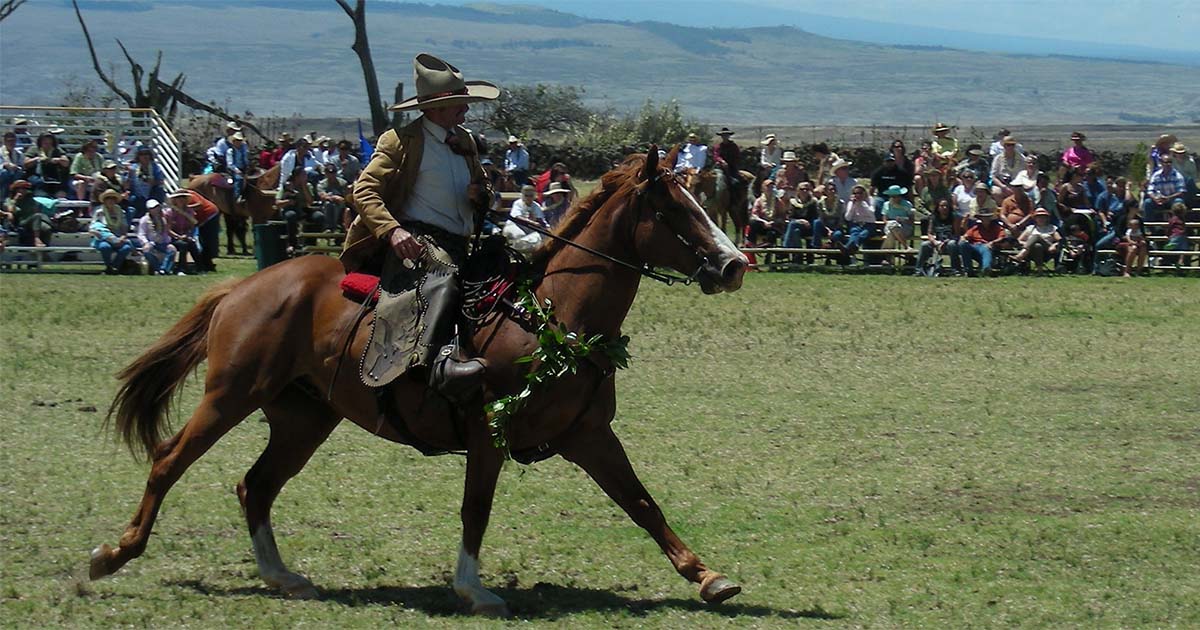
An optimist by nature
Harry Martens von Holt II was born in North Kohala in 1948. Named after his paternal grandfather, he grew up on Kahua Ranch, working side by side with Hawaiian cowboys who adapted his name from Harry von Holt to “Hale Pono Holo,” and the nickname stuck. “Pono” had two adopted siblings, Marion Kapio‘lani, (Pi‘o), and John Pinney, (Pini).
“So the family story was that there was Pi‘o Pini and Pono, and then my dad was pau,” says Pono, Paniolo Hall of Fame Class of 2011. “Pono holo is also a navigational term that I’d learned later, which means when you’re out there on a canoe, then your stars lined up, and you’re going the right way, it was pono holo.” In the 1980s, Ponoholo also became the name of the von Holt’s ranch.
The story of course begins years earlier, with the partnership of Ronald Kamehameha o ka hae Hawai‘i, grandson of a German shopkeeper who came to the Islands in 1851, and Atherton Richards, whose grandfather was missionary William Richards. In 1928, Ronald and Atherton (PHOF Class of 2000) teamed up to purchase and operate Kahua Ranch, which they did successfully for 26 years.
Pono says that the Ranch had a good business raising horses for US Cavalry during WWI and II. “And then of course, we had a local thing called Hawaiʻi Rifles,” says Pono. “It was local community guys like a National Guard that patrolled this coastline and it was all by horseback. We had to patrol it because we were under threat of invasion. And my father ran the battalion in Kohala. He was a Lieutenant Colonel in the Hawaiʻi Rifles Battalion.”
He has many fond memories of ranch life, and the special people who worked there—like Kaulu Pohaku, Peter Kainoa, John Iokepa and Alec Akau, who drove a WWII-era weapon carrier. “When they had a good movie in Kohala, he’d get his kids, put them in the weapon carrier,” says Pono in his Oral History. “He’d drive here and pick up all the ranch kids that wanted to go to the movies and take them to Kohala. They’d go to a movie. Usually a matinee in the daytime. And then drive them back around, drop them off and take them back.”

Harry M. “Pono” von Holt
Unexpectedly, Ronald died in 1953, leaving wife Dorothy to raise six-year-old Pono, his brother and sister. Atherton’s nephew Monty Richards (PHOF Class of 2000) became ranch manager, and the von Holts moved to Honolulu, coming back for vacations and summers. Pono attended Punahou School, then The Thatcher School in Ojai, CA, University of Vermont and University of Hawai‘i where he earned a Masters Degree in Agriculture Economics. In 1972, he came back to the island to assist Monty at Kahua.
When Atherton passed away in 1976, the Ranch had grown significantly, as had the two families. After careful consideration, the decision was made to divide the Ranch into two separate ranches, Kahua and Ponoholo, sharing some resources in common.
“We still do a lot of things together. Water, for instance. We help each other out,” Pono says. “There’s only one Kohala mountain. And Kahua Ranch, Ponoholo Ranch, Parker Ranch… the old sugar company of Kohala all depended on that water. That mountain grows water. And so we pretty much
jointly managed that resource.” Pono says they have stewarded the water by stewarding the forest, in partnership with other land owners and state agencies over the years.
The need for water has remained, but other aspects of ranching life have changed over the years. Pono says a “paradigm shift” has occurred at Ponoholo Ranch.
“The shift in the paradigm is asking your cattle,” Pono says. “Because you know what cattle want. They want to be comfortable. They want to eat; they want to drink; they want to have some space to be in. So what we can control is what they eat and what they drink. And water needs to be available all the time. But the feed resource, they’d prefer something that’s fresh. So when they eat the grass that they’re on, they’re going to look elsewhere… They learn real quickly that when you call, that you’re calling them to come through a gate for fresh grass. It takes them about four days and then they figure it out.”
“And all you do is open the gate,” he continues. “So what it does in the paradigm shift is then you’re asking, you’re not forcing. The cattle respond because they’re getting something good.”
All things considered, Pono sees a good future for ranching in Hawai‘i.
“I’m an optimist by nature or I wouldn’t be in the business this long,” Pono says. “I think there’s opportunity out there and there’s a lot of challenges to go with it. The thing that makes me proud is that this industry has survived a long time. I mean we’re still here. We’ve outlived sugar; we’ve outlived pineapple. So we’ve been able to adapt enough to survive. And I still think we can do that.”
Read Harry M. “Pono” von Holt’s oral history interview (PDF).
